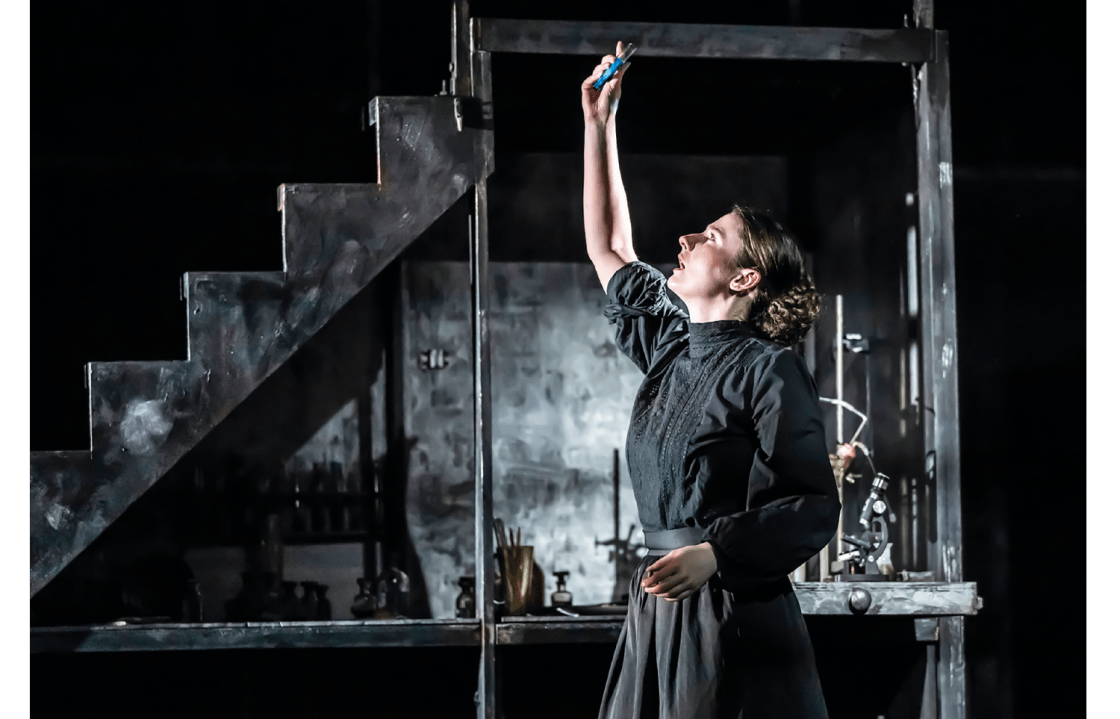Marie Curie: The Musical is a history lesson combined with a chemistry seminar and it’s aimed at indignant feminists who want to agonise afresh over the wrongs of yesteryear. We meet the young Marie, wearing her signature widow’s frock, as she speeds towards Paris on a train from Poland.
The essential materials of this musical are hard to get to grips with; the characters stiff, the tunes so-so
This opening scene is positively trembling with significant detail. Her fellow passenger, Sarah, is an impoverished Pole who has rejected the advances of a wealthy swineherd and decided to take a job at a Parisian glassworks. Her plan is to save all her wages and buy land in Poland which she will farm herself while sinking the profits into a theatre that specialises in cabaret. Wow. What an amazingly ambitious female migrant.
As the women part, Sarah gives Marie a handful of Poland’s precious soil, which she just happens to have in her purse. They vow to meet again and compare notes. Sarah already sounds a lot more interesting than the mousy little Marie, whose only aim is get her nose into a chemistry book and keep it there.
At the Sorbonne, she’s bullied by the male students even though she’s the smartest pupil at the university. She meets Pierre Curie, a passionless geek, and they contract an arid marital bargain. His job is to mind the kids and keep the house tidy while she runs the home-made laboratory and makes prize-winning breakthroughs. Marie’s science gear sits on the kitchen table and when she discovers polonium, she celebrates by inviting a few guests over to share a festive cake. Luckily, none of them dies of radioactive poisoning.
The essential materials of this musical are hard to get to grips with. The characters seem stiff and predictable. The tunes are so-so. The costumes look fabulous but the men’s trousers are deliberately cut too short, which makes the actors appear silly rather than attractive. A pity. The brooding Gothic set is ugly and overdetailed. Scruffy chemical equations cover the back wall, and the dominant motif of black-and-grey latticework is irksome to look at.
Marie would be a more attractive personality if she had a bit of passion and warmth about her. Instead she’s distant and snippy. Her friendship with Reuben, a dashing Parisian entrepreneur, looks promising but it remains platonic. Reuben is a charismatic whizzkid, steeped in classical learning, who wants to commercialise scientific innovations by finding ‘the new Prometheus’.
When Marie discovers radium he grabs his chance and sets up a string of factories that produce glowing toys, ornaments and even toothpaste. Profits soar. Thanks to Marie’s influence, the workforce consists mainly of poor Polish women – including Sarah, who accepts the role of factory manager. No one sees the danger ahead.
The workers are told to moisten their radium-steeped paintbrushes with saliva from their tongues, but this causes necrosis of the jaw. The women fall sick and die. To protect his profits, Reuben announces ‘syphilis’ as the cause of death which is not just a fib, but an insult to the women’s moral dignity.
Anyone looking for a documentary about female scientists will enjoy this show and it ends with a stirring speech outlining Mme Curie’s achievement as a woman who enriched the fields of chemistry and physics (she won the Nobel Prize in both disciplines). Fair enough, but those battles ended a century ago and the reactionaries who tried to thwart her career are dead. People in today’s West End want to be entertained, not denounced.
Even if you don’t listen to podcasts or read detective stories, you’ll find this show irresistible
More female empowerment at the Ambassadors. Kathy and Stella Solve a Murder! is a musical about two podcasters who track down the killer of a famous female writer. The main suspect is a fat, middle-aged drifter who once worked as a policeman and who may be connected to a notorious criminal called the ‘Hull Decapitator’.
The show seems to have the ideological lineaments of a feminist tract, but it’s nothing of the sort. It’s full of self-mockery and careless debonair mirth.
Kathy and Stella are a pair of awkward losers, both pushing 30, whose families expect them to settle down and have kids. Their dream is to find the elusive killer and transform their disregarded podcast into a worldwide hit.
The show contains bittersweet celebrations of failure. Kathy admits that her university career consisted of many months spent alone in her room followed by ‘an emotional breakdown in the Co-op’. When they start to investigate the murder, they have no clues, no forensic equipment and no experience of detective work. This prompts a hilarious anthem to incompetence, ‘We Don’t Know What We’re Doing.’
The show makes few demands of the audience but it has terrific comic integrity and a wonderful sense of fun. Even if you don’t listen to podcasts or read detective stories, you’ll find it irresistible.









Comments